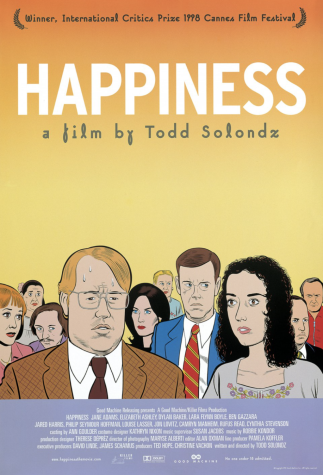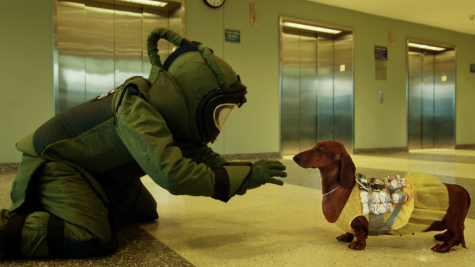Todd Solondz
Content Warning: Practically every taboo from A to Z can be found in Solondz’s filmography. His movies almost never show blood or nude actors on screen, but this somehow makes his films more disturbing. All of them are rated R or worse. I would heavily advise against watching any of these movies with family or a date. If you don’t like dark humor, I would not recommend any of these.
What is hell? In his 1944 play No Exit, philosopher Jean-Paul Sartre famously writes that “hell is other people.” For the play’s three main characters, eternal punishment for their souls comes in the form of a plain room after they die. It has no torture devices nor flames to burn their skin. Rather, the three reprehensible people are destined to mentally torment each other forever due to what they cannot have from the others. To Todd Solondz’s characters, hell is the human condition. They all would define their personal hell differently, but all of them are united by their struggle for human connection, for the loneliness to go away. For meaning and love. As expected, the plots are driven by their failures.
In case you couldn’t tell, these movies are incredibly heavy and disturbing. This isn’t to say his movies are all crushing negativity all the time—most have tender moments and comedy buried in the irony and lack of meaning—but the subject matter and plot can be so bleak that it’s hard to imagine an audience. Solondz employs an awkward, caustic sense of humor that definitely isn’t for everyone. Some scenes (especially in Happiness and Palindromes) are almost impossible to laugh at or even watch. His films are generally quiet and low-budget, gently walking the knife’s edge between comedy and drama. There are almost no complete heroes or innocents, and a few absolutely evil characters (Bill from Happiness), but most reside in a moral gray area. They’re complex and deeply human. They have their motivations and faults and virtues. Though Bill is vile, he is by no means one-dimensional. No one is.
Take, for example, dear Dawn Weiner from Welcome to the Dollhouse. We build lots of empathy for this bullied and neglected child—even when she acts selfishly, cruelly, and takes her anger out on her favored younger sister, even when her catharsis builds from name-calling to contemplating murder. The main antagonist of the movie (her bully, Brandon) is vicious, but we also feel empathy for him. He obviously holds love for his disabled little brother, and struggles with emotions and his sense of masculinity due to almost no positive influence in his life.
There are immensely flawed protagonists and sympathetic antagonists, and their dynamic has a portrayal beyond black-and-white, good and evil. And it rarely feels like Solondz is inviting us to laugh at his characters like they’re in a freak show. They are examined with a careful eye, and while their actions may inspire disgust, contemplation, laughter, or some combination of the three, they feel real. Their emotion drips off the screen. Some find what they are searching for, most do not, but they all make you feel something. And that is all I want from a movie. It’s almost motivational how Solondz wrings out life’s worst moments and finds something resembling humor. Almost, but not quite. He’s too thorough a pessimist for any of that.
So why am I writing about this? I wanted to highlight an underrated and non-mainstream director that many people here haven’t heard of, and the odd little niche he has in American cinema. You may find no value in these movies, and I’d understand that. But if you’re ever feeling like a misanthrope or want to challenge yourself to watch something out of your comfort zone, look no further than Solondz. Now to explore these portraits of American hell…
Welcome to the Dollhouse (1995)–A Hell of Middle School and First Love
Dawn Weiner would define hell as middle school. Everything about her—her name, her face, her clothes, her perceived sexuality, her physical weakness, her voice—it’s all relentlessly mocked by bullies, day-in, day-out. She has virtually no friends and goes home to an uncaring family—parents who love her overachieving brother and pretty younger sister while she remains an afterthought. The boy she likes is seven years older and doesn’t care about her existence, and the only boy who shows interest in Dawn is her aggressive, delinquent bully.
Incredibly bleak yet shot in bright colors and backed by a phenomenal soundtrack, the movie manages to bring unexpected humor, irony, and complexity to this girl’s neverending void of despair. Ironically, this is the most hopeful Solondz film, and Heather Matarazzo plays the role to awkward perfection. An effective tragicomedy as well as a blunt satire of American teen movies, especially edgy high school dramas and romances. If you only watch one Solondz movie, I would recommend this (or Weiner-Dog), though it’s still definitely not for everyone. Please don’t be like me and watch it on a date.
Rating: 10/10. This may be my favorite movie of all time.
Funny? If you appreciate dark humor, it’s a riot! It can get very politically incorrect, but stays realistic to how middle schoolers and unjust authority talk.
Disturbing? The Brandon scenes are quite uncomfortable, but he doesn’t hurt her.
Depressing? Mostly, but well-mixed with humor. You feel so sorry for the loveless and lonely Dawn, and just want to help her out of her life. But it’s depressing in a much more palatable way than his other films, such as…
 Happiness (1998)–A Hell of Loneliness and Repression
Happiness (1998)–A Hell of Loneliness and Repression
Joy Jordan would define hell as her struggle to be fulfilled and loved. However, she ends up meeting terrible guys and feels empty at her job teaching English. Helen Jordan, her sister, similarly goes through hell trying to find love, and although she is famous and could have anybody she wants, she thinks nobody wants her for who she is. Her neighbor Allen (Philip Seymour Hoffman!) also wants human connection, but spends most of his time making disgusting phone calls to random women. His therapist Bill wants…no, I’m not going to type that here.
The loosely connected ensemble cast explores the depravity and desperation brought on by loneliness, and the extremes people go to just to feel something, anything, and the lowest depths of secrets hidden under a seemingly normal American family. Its depiction of evil is incredibly uncomfortable to watch—the characters desperately rationalize their actions and their emotions appear so raw and genuine. Yes, the title is ironic. This is probably the darkest movie I have ever seen that is still meant to be a comedy.
Rating: 10/10. However, I encourage you not to watch it.
Funny? A little. Some subplots are mostly humorous (Allen and Kristina) and others are sickening (Bill), and their themes and characters often intertwine. Two of the most unsettling conversations in the movie end with some of the most ironic, unexpected lines in the movie, almost forcing you to laugh. And then Solondz leaves you there staring at the screen blankly, questioning your morality.
Disturbing? YESSSSSSSSS. While almost all the most disturbing content happens completely offscreen, this is somehow worse.
Depressing? Crushingly so, but not as depressing as…
Palindromes (2004)–A Hell of Identity and Fatalism
Aviva, a teenage girl (and Dawn Weiner’s cousin), defines happiness as wanting to have a baby. Just reading this one sentence and knowing that it is a Todd Solondz movie, you know it won’t go well. Much of the movie centers around themes of identity, motherhood, abortion, and natalism. This is his most experimental, pessimistic, fatalistic, and disturbing film—even more disturbing than Happiness. Its most unique feature is that eight actors (some white, some black, some old, some young, one male) play the same teenage girl. Aviva’s most convincing actress (and the best actress in the movie) is Sharon Wilkins, a plus-sized black woman in her mid-forties. The revolving door of disparate actors somewhat alienates us from the teenage girl, making us see the story in a more abstract way. However, the character remains the same no matter what setting or portrayal or environment she stumbles into.
This stylistic feature, as well as a long, fatalistic monologue by Dawn’s brother, give us the theme that you cannot change who and what you are. No matter how hard you try, no matter what you do or where you go or who you meet, you cannot change your nature. It’s bleak. The overwhelming fatalism alongside the two disturbing central themes makes this one scarier than 99% of standard horror movies. Some parts made me physically recoil, and this is coming from someone who’s pretty desensitized to fictional horror media. And it’s rarely funny, if at all. Solondz spent his life savings financing this movie because studios refused to back it. It’s not hard to see why.
Rating: I’m not sure what to rate this. It’s an amazingly made movie, but I’m not sure I want to watch it ever again because it made me feel thoroughly empty. Solondz had a vision and put all his effort into its creation. It encapsulates everything I love and hate about his movies, especially the Mama Sunshine sequence. It will stay in my mind for a long time.
Funny? At rare moments, but this often gets overwhelmed by the darkness.
Disturbing? Yes. Yes. Yes. Oh my god, yes. You have to be really prepared for this movie.
Depressing? The entire movie lies under a crushing blanket of futility. Something about as futile is…
Dark Horse (2012)–A Hell of Immaturity
Abe lives in a self-constructed hell of immaturity. He lives at home with his parents and only has a job because his father feels sorry for him. He wants to find love, but no woman likes him. He goes on a date with a suicidal woman named Miranda, who is not at all attracted to him. However, he goes to her house a week later to propose marriage, and after thinking about it for a few days, she says yes. A terrible relationship ensues, culminating in a bizarre speech at Toys R Us where Abe talks about receipts as a metaphor for life (it’s unclear if this scene is real) and an extremely ironic ending. Through-and-through, this movie is a portrait of immaturity. Though the main character fosters some empathy because the world regards him as a total failure, he is so obnoxious that it actively repels you from the movie.
Rating: 6/10. Not my favorite, I’m not sure what you were supposed to get from this. I did greatly enjoy the ending, however, and the proposal scene.
Funny? Yes, it’s incredibly awkward and gets much of its power from cringe comedy and irony.
Disturbing? Actually, no. There’s virtually no violence or disgusting content.
Depressing? Yes. It feels really pointless, but NOTHING is as pointless as…
 Weiner Dog (2016)–A Hell of Pointlessness and Nihilism
Weiner Dog (2016)–A Hell of Pointlessness and Nihilism
A shaggy dog story is “an extremely long-winded anecdote characterized by extensive narration of typically irrelevant incidents and terminated by an anticlimax.” I think this perfectly describes Weiner-Dog. The movie is an ensemble comedy centered on an adorable little weiner dog making its journey through America. It stars Danny DeVito, Julie Delpy, Kieran Culkin (as Brandon), and Greta Gerwig (as Dawn!), and has overwhelmingly negative reviews from people seeing these actors and expecting a cute canine comedy. The dog is cute and it is the one constant throughout the movie, but it exists to walk through hellish landscapes of human misery and people without purpose. I still cannot decide whether the last five minutes were the worst or best movie ending ever.
Only Solondz would make this cute movie have monologues about stillborn puppies and the cruelty of fate, road-trip conversations about generational trauma and dysfunctional families, screenwriter and domestic terrorist Danny DeVito, and a misanthropic grandma reflecting on mortality and meaninglessness. The last five minutes, though. Wow. I love this movie despite its pointlessness–perhaps because of it. Call it postmodern art or call it garbage, I don’t care. What does it matter, anyway? Even as a Solondz fan, I will say this movie had no point (but wasn’t that the point? To find the point in pointlessness, and isn’t finding meaning within the meaningless basically existentialism?) Is this high, philosophical art? Is this an incredibly stupid, bitter movie? Yes and yes. You should watch it.
Rating: 9/10. It was either that or a zero, but I laughed too much.
Funny? It can get hysterically funny, but only for a very niche audience.
Disturbing? Mostly in a psychological way, when it examines people’s lives, but the ending is extremely shocking.
Depressing? The majority is depressing, especially the final five minutes, but the Dawn segment in the middle was strangely beautiful and I wish it would have continued longer.

Evan Hamaoka is a senior at Keystone. His hobbies include creative writing, playing guitar, eternally searching for the worst movie of all time,...

